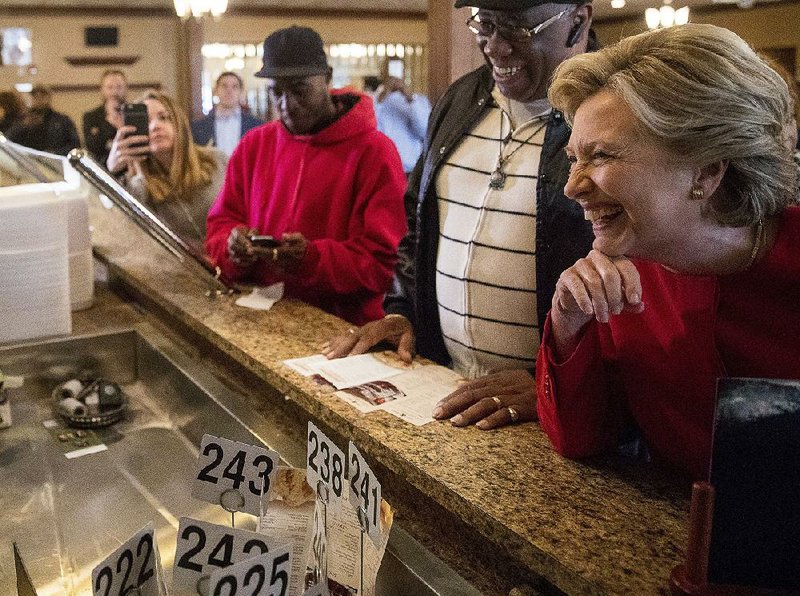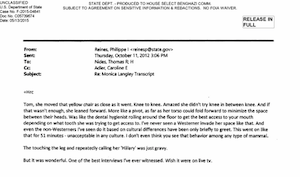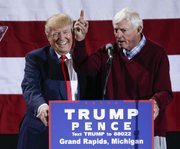GRAND RAPIDS, Mich. -- Donald Trump plunged into his final-week sprint to Election Day on Monday by unleashing a harsh new attack against Democrat Hillary Clinton in Michigan, a state that hasn't favored a Republican for president in nearly three decades.
His message was welcomed by supporters, but his location frustrated Republicans who fear their nominee is riding his unorthodox political playbook too long -- even as Clinton's developing email problems offer new political opportunity.
"Her election would mire our government and our country in a constitutional crisis that we cannot afford," Trump declared in Grand Rapids, pointing to the FBI's renewed examination of Clinton's email practices as evidence the former secretary of state might face a criminal trial as president.
Meanwhile, WikiLeaks released a new trove of documents, including an email that appears to tip off the Clinton campaign to a question that would be asked at a "town hall" debate during the primary.
[INTERACTIVE: 2016 election coverage]
Trump, too, was dealt a blow Monday; The New York Times reported that newly obtained documents suggest the Trump, to stave off financial ruin in the early 1990s, avoided reporting hundreds of millions of dollars in taxable income.
He did so, the Times reports, by using a tax-avoidance maneuver so legally dubious that his own lawyers advised him that the Internal Revenue Service would likely declare it improper if he were audited. The maneuver was later outlawed by Congress.
Tax experts who reviewed the documents for the Times said Trump's tax-avoidance maneuver, conjured from provisions of highly technical tax court rulings, clearly pushed the edge of the envelope of what tax laws were permitted at the time.
National polls show a tightening race. But with more than 23 million ballots already cast through early voting, it's unclear whether Trump has the time or capacity to dramatically improve his standing over the next week in states like Michigan, where few political professionals in either party said they expect a Republican victory on Nov. 8.
Clinton, defending herself from the new FBI review, focused Monday on battleground Ohio, a state Trump's team concedes he must win.
"There is no case here," Clinton insisted. "Most people have decided a long time ago what they think about all this."
Later in the day, Clinton campaign manager Robby Mook decried what he called a "blatant double standard" after a CNBC report that the FBI director opposed releasing details about possible Russian interference in the U.S. election because it was too close to Election Day. Comey issued a letter to congressional leaders on Friday about the FBI's renewed interest in Clinton's email.
The Associated Press has not confirmed the CNBC report, and the FBI declined to comment Monday.
Campaigning earlier Monday in Grand Rapids, Trump said Comey "brought back his reputation" with his notice to Congress on Friday that he would look at new information in the case.
"It took a lot of guts" for Comey to change course three months after ending the probe into whether classified information was compromised, the Republican nominee said.
"I really disagreed with him" over that earlier decision, Trump said. "I was not his fan. But what he did brought back his reputation."
Prompt review urged
The FBI will have to sort through thousands of newly discovered emails in its renewed examination of the practices of Clinton and her aides, a U.S. official said Monday, raising questions about whether any findings might be released before Election Day. The official was not authorized to discuss an ongoing investigation by name and spoke to the AP on condition of anonymity.
The Justice Department, moving to address concerns over the timing of the revelation of the emails and a potential postelection spillover, said Monday in a letter that it would "dedicate all necessary resources" to concluding the review promptly.
In its brief note to six lawmakers, the department said it will work closely with the FBI to take "appropriate steps as expeditiously as possible" in the new review.
Trump has been assailing Clinton ever more vigorously since Comey revealed the existence of the emails Friday. Comey said agents would take steps to review the messages, which were found on a computer seized during an unrelated investigation involving the estranged husband of a Clinton aide.
Rep. Anthony Weiner, a former New York congressman, is being investigated in connection with online communications with a teenage girl. He was separated this year from Huma Abedin, one of Clinton's closest advisers.
At the White House, spokesman Josh Earnest said he would neither defend nor criticize the timing of Comey's disclosure. But he also said President Barack Obama does not believe that Comey was trying to influence the election or strategizing to benefit one candidate or party.
It was not immediately clear exactly how many emails have been recovered or what significance, if any, they might have. But the U.S. official who spoke to the AP said they number in the thousands and that the FBI, which had a warrant to begin the review, would be focusing on those deemed pertinent to its earlier Clinton email server investigation. It's unclear how many emails might be relevant.
Latest WikiLeaks release
In a new WikiLeaks documents release, an email apparently sent by a top official with the Democratic National Committee who also was a CNN analyst stokes doubts about the practices of Clinton's campaign.
Donna Brazile in an email appears to notify Clinton's presidential campaign in March about a question to be asked at a town-hall-style debate during the primaries, according to the leaked documents.
It marks the second purported email indicating Brazile had tipped off the Clinton campaign to questions that were supposed to be kept secret during the Democratic primaries, when the committee was ostensibly neutral toward all Democratic hopefuls. The alleged email posted Monday said Clinton would be questioned by a woman from Flint, Mich., about the town's tainted water. An alleged memo released earlier told the campaign that Clinton would be asked about the death penalty at another event that month.
Brazile, who didn't respond Monday to a request for comment, said after WikiLeaks posted the earlier email that she never had access to debate questions and wouldn't have shared them if she did. She suggested then that the WikiLeaks documents may have been "misinformation." The Clinton campaign has said the Russian government hacked the emails of campaign Chairman John Podesta and may have altered or concocted some of the thousands it has been posting.
A day before the March 6 debate sponsored by CNN in Flint, Brazile allegedly wrote Podesta and Jennifer Palmieri, the Clinton campaign's communications director, that a woman from the town "has lead poison and she will ask what, if anything, will Hillary do as president to help the ppl of Flint."
During the town hall meeting, Lee-Anne Walters, who had a son who had stopped growing and a daughter who lost her hair, asked Clinton and Sen. Bernie Sanders of Vermont, her primary rival, whether they would "make a personal promise" to make the removal of lead a requirement for public waters in their first 100 days in office, according to transcripts of the debate provided by CNN. Both candidates did.
Brazile resigned from CNN as a contributor Oct. 14. Her work there had been suspended when she became interim chairman of the Democratic National Committee in July, a CNN spokesman said.
Lauren Pratapas, a CNN spokesman, said Monday that the cable news channel "never gave Brazile access to any questions, prep material, attendee list, background information or meetings in advance of a town hall or debate."
"We are completely uncomfortable with what we have learned about her interactions with the Clinton campaign while she was a CNN contributor," Pratapas said in an email.
The question on the death penalty was written by that debate's co-moderator, Roland Martin of the TV One chnnel. Politico quoted Martin as saying he didn't "believe" he had shared it with Brazile. Neither TV One nor Martin were involved in the earlier debate, which was the subject of the alleged email leaked Monday.
Trump in Michigan
Trump plans this week to devote his time to states where polls suggest he's trailing Clinton by significant margins.
The Republican nominee had two rallies Monday in Michigan, a state that last went for a Republican presidential nominee in 1988. The day before, he appeared in New Mexico, which has supported the GOP just once over the past three decades. And today, he's scheduled to appear with running mate Mike Pence in Wisconsin, which hasn't backed a Republican for president since Ronald Reagan's re-election in 1984.
"It makes no sense to me," Republican pollster Frank Luntz said of Trump's strategy.
Michigan-based Republican operative Saul Anuzis described Michigan as "a creative opportunity" for Trump.
"The demographics in Michigan are perfect for Trump," Anuzis said of the state's large, white, working-class population. "That doesn't mean he'll necessarily win here."
In Warren, Mich., Trump hammered on the issue of Clinton's emails during an afternoon rally that started more than two hours late in the Detroit suburb.
He said he expects the FBI to find some of the 33,000 emails that have yet to be uncovered among the 650,000 emails that are reportedly on Weiner's confiscated laptop. He repeated his claim that Clinton's use of a private email server "the biggest scandal since Watergate," and told Clinton to stop blaming the scandal on others.
"Hillary Clinton wants to blame everyone else for her mounting legal troubles," Trump said. "But she has brought this situation onto herself. She's got nobody to blame but herself."
Trump's campaign hopes that frustrated working-class voters across the Midwest will tip states like Michigan or Wisconsin his way, especially if he benefits from reduced enthusiasm for Clinton in black strongholds such as Detroit and Milwaukee.
Millions of people have already voted by mail and at polling stations across 37 states. They include critical states such as Florida, Nevada and Colorado, where one-third of the expected ballots have already been cast.
Overall, more than 23 million votes have been cast, far higher than the rate in 2012, according to AP data. That represents nearly 20 percent of the total votes expected nationwide, if turnout is similar to 2012. In all, more than 46 million people -- up to 40 percent of the electorate -- are expected to vote before Election Day.
Information for this article was contributed by Jonathan Lemire, Steve Peoples, Julie Pace, Lisa Lerer, Hope Yen, Sam Hananel, Nicholas Riccardi, Eric Tucker, Michael Biesecker and Thomas Beaumont of The Associated Press; by Sari Horwitz and Tom Hamburger of The Washington Post; by Ben Brody of Bloomberg News; and by David Barstow, Mike McIntire, Patricia Cohen, Susanne Craig, Russ Buettner and Megan Twohey of The New York Times.
A Section on 11/01/2016


